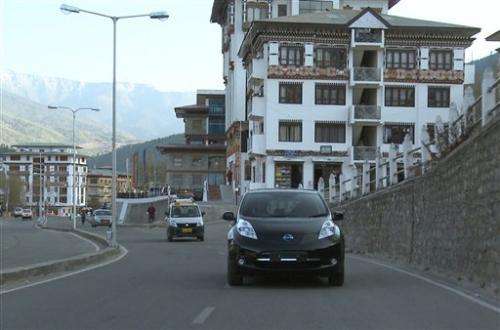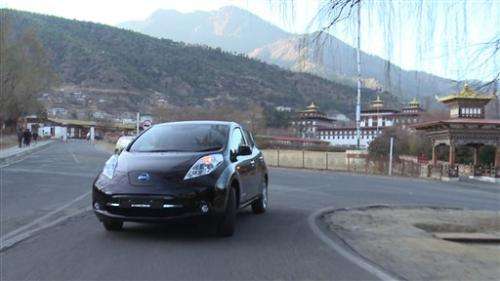In this undated photo released Friday, Feb. 21, 2014 by Nissan Motor Co., the Japanese automaker's electric car Leaf, right, runs in Thimphu in Bhutan. The Himalayan kingdom of Bhutan and Nissan are partnering on electric cars, with the Japanese automaker's Leaf being chosen for the government fleet and taxis. Under a deal announced Friday, Feb. 21, 2014, Nissan will help Bhutan achieve its goal of becoming a zero-emissions nation. (AP Photo/Nissan Motor Co.)
The Himalayan kingdom of Bhutan has tapped Nissan Motor Co. to supply electric cars for its taxis and government fleet, hoping to reduce reliance on imported oil.
Under the agreement announced Friday, Nissan will supply its Leaf electric car and set up charging stations in Bhutan.
Bhutan, with a population of 720,000, produces and exports hydroelectricity. But it's eager to reduce its dependence on fossil fuels shipped in from abroad.
The tiny landlocked country was long known for measuring "gross national happiness" instead of traditional indicators of prosperity such as GDP. But since 2013, a new government under Prime Minister Tshering Tobgay has downplayed that as a distraction from problems of poverty and corruption.
The Leaf is the world's best-selling electric car, selling a cumulative 100,000 so far since going on sale in late 2010, comprising 45 percent of the global electric vehicle market.
The car has struggled to reach a critical mass in sales, especially when compared to hybrid models, for instance, but the Leaf remains the symbol of Nissan's commitment to the environment and shows off its engineering prowess.
Nissan has agreements with more than 100 nations, states and cities globally to promote electric cars, including the Spanish city of Barcelona and Sao Paulo in Brazil.
In this undated photo released Friday, Feb. 21, 2014 by Nissan Motor Co., the Japanese automaker's electric car Leaf runs in Thimphu in Bhutan. The Himalayan kingdom of Bhutan and Nissan are partnering on electric cars, with the Japanese automaker's Leaf being chosen for the government fleet and taxis. Under a deal announced Friday, Feb. 21, 2014, Nissan will help Bhutan achieve its goal of becoming a zero-emissions nation. (AP Photo/Nissan Motor Co.)
Most deals in electric cars tend to be with developed nations, making Bhutan a relatively unusual case. Nissan wants to study how its electric vehicle business fits with a developing nation that has substantial clean energy resources.
Nissan President Carlos Ghosn said the deal would involve hundreds of electric cars in the short term as Bhutanese government officials start driving them, and then thousands as the whole nation goes electric.
He also said similar deals with other places were in the works, as increasingly emerging markets combine protecting the environment through electric cars with development, as Bhutan is doing.
"Many emerging markets want to protect the environment," Ghosn said by phone from Bhutan's capital, Thimphu.
The thinking has been that development goes hand in hand with pollution, but Ghosn said that was changing, and that Nissan was supporting Bhutan's transportation vision.
Bhutan and Nissan will study how to further cooperate on green technology, both sides said.
Ghosn presented two Leaf vehicles to Bhutan on Friday, the birthday of Bhutan's king.
Sandwiched between Asian giants China and India, Bhutan was long closed to the rest of the world before starting to open up in the 1960s. Foreigners and the international media were first admitted in 1974, and television arrived only in 1999.
Prime Minister Tobgay, who has a master's in public administration from Harvard University, has pushed for giving more power to regular people.
"Nissan's global experience will be invaluable as we make progress toward an electrified national transport infrastructure," Tobgay said.
© 2014 The Associated Press. All rights reserved.
























